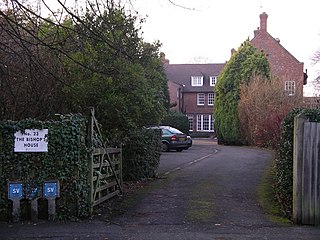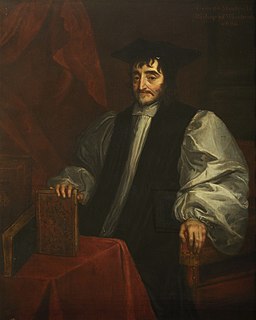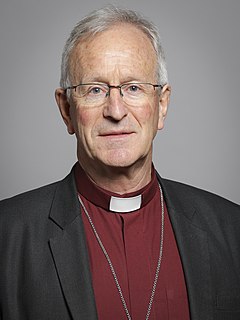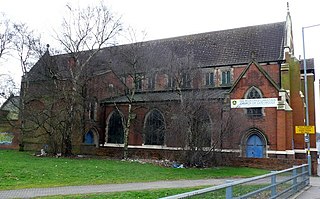
Newport Cathedral, also known as St Woolos Cathedral, is the cathedral of the Diocese of Monmouth, in the Church in Wales, and seat of the Bishop of Monmouth. Located in the city of Newport in South East Wales, its full title is Newport Cathedral of St Woolos, King & Confessor.

The Bishop of Coventry is the ordinary of the Church of England Diocese of Coventry in the Province of Canterbury. In the Middle Ages, the Bishop of Coventry was a title used by the bishops known today as the Bishop of Lichfield.

The Diocese of London forms part of the Church of England's Province of Canterbury in England.

Brecon Cathedral, in the town of Brecon, Powys, is the cathedral of the Diocese of Swansea and Brecon in the Church in Wales and seat of the Bishop of Swansea and Brecon. Previously the church of Brecon Priory and then the Parish Church of St John the Evangelist, it became Brecon Cathedral following the disestablishment of the Church in Wales in 1920 and the creation of the diocese in 1923.

George Morley was an English Anglican bishop, Bishop of Worcester and then of Winchester.

The Bishop of Birmingham heads the Church of England Diocese of Birmingham, in the Province of Canterbury, in England.

The Diocese of Bristol is an ecclesiastical jurisdiction or diocese of the Church of England in the Province of Canterbury, England. It is based in the city of Bristol and covers South Gloucestershire and parts of north Wiltshire, as far east as Swindon. The diocese is headed by the Bishop of Bristol and the Episcopal seat is located at the Cathedral Church of the Holy and Undivided Trinity, commonly known as Bristol Cathedral.

The Diocese of Gloucester is a Church of England diocese based in Gloucester, covering the non-metropolitan county of Gloucestershire. The cathedral is Gloucester Cathedral and the bishop is the Bishop of Gloucester. It is part of the Province of Canterbury.

The Bishop of Gloucester is the ordinary of the Church of England Diocese of Gloucester in the Province of Canterbury.

St. Mary's Church, Selly Oak is a Church of England parish church in Selly Oak, Birmingham, England.

The Bishop of Bristol heads the Church of England Diocese of Bristol in the Province of Canterbury, in England.
The Archdeacon of Westmorland and Furness is a senior ecclesiastical officer within the Diocese of Carlisle. As such he or she is responsible for the disciplinary supervision of the clergy within its four rural deaneries: Barrow, Windermere, Kendal and Furness.

Christ Church, Birmingham, was a parish church in the Church of England on Colmore Row, Birmingham from 1805 to 1899.
The Archdeacon of Sheffield and Rotherham is a senior ecclesiastical officer within the Diocese of Sheffield, responsible for the disciplinary supervision of the clergy within the six area deaneries.

St Thomas’ Church, Bath Row, Birmingham is a former Church of England parish church in Birmingham.

St Luke's Church, Bristol Street, Birmingham was a former parish church in the Church of England in Birmingham, later used by the Redeemed Christian Triumphant Church of God. The building was demolished in 2018 as part of a housing redevelopment project by Barratt Homes.
Immanuel Church, Birmingham, later known as St Thomas and Immanuel, Birmingham was a Church of England parish church in Birmingham.
St Asaph's Church, Great Colmore Street was a Church of England parish church in Birmingham.













